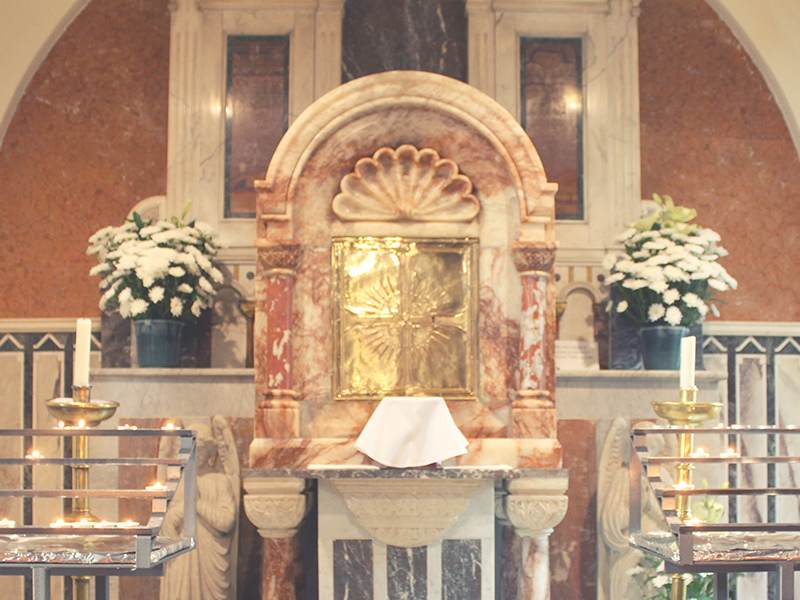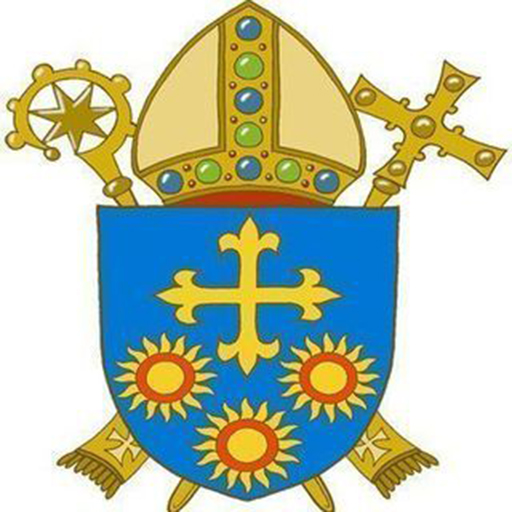Eucharist
“The Eucharist is the heart and the summit of the Church’s life, for in it Christ associates his Church and all her members with his sacrifice of praise and thanksgiving offered once for all on the cross to his Father; by this sacrifice he pours out the graces of salvation on his Body which is the Church” (Catechism of the Catholic Church, 1407).

Baptism and Confirmation are the first two sacraments of Christian initiation, and they find their fulfillment and perfection in the source and summit of the Christian life: the Most Holy Eucharist. As the Second Vatican Council (1963-68) teaches,
“At the Last Supper, our Savior instituted the Eucharistic sacrifice of His Body and Blood. This He did in order to perpetuate the sacrifice of the Cross throughout the ages until He should come again, and so to entrust to His beloved Spouse, the Church, a memorial of His death and resurrection: a sacrament of love, a sign of unity, a bond of charity, a Paschal Banquet in which Christ is consumed, the mind is filled with grace, and a pledge of future glory is given to us”
(Sacred Constitution on the Liturgy, 47).
At the heart of the Holy Eucharist are the bread and wine that, by the words of Christ and the invocation of the Holy Spirit, truly and substantially become the Body and Blood of the risen and glorified Lord Jesus. In the Old Covenant bread and wine were offered in sacrifice among the first fruits of the earth as a sign of gratitude to God, but they also received a new meaning by the Exodus of Israel from slavery in Egypt.
The unleavened bread of Passover recalls the haste of departure on pilgrimage to the promised land, and manna in the desert testifies that God always fulfills His promise to sustain His people. Moreover, blood is the sign of fidelity to God’s covenant with Israel and of sorrow for sins which violate God’s law.
And finally, the cup of blessing at the end of the Jewish Passover meal transforms the simple human joy in wine into a sign of God’s saving action in history: the messianic expectation of the rebuilding of Jerusalem. All of these meanings were taken up and transformed by the Lord Jesus, the true Lamb of God, when He instituted the Holy Eucharist and commanded the Church to celebrate this sacrifice until He comes again in glory.
The Most Holy Eucharist is described in sections 1322-1412 of the Catechism of the Catholic Church, and we encourage every family to study these pages of the Catechism carefully in order to understand more deeply the inexhaustible riches of the sacred Mystery of Christ’s Body and Blood.
In the other six sacraments, God gives us a gift of grace; in the Holy Mass He gives us the gift of Himself. That is why the Holy Eucharist is the Sacrament of sacraments, the Mystery of mysteries. The Lord Jesus urgently invites us to receive Him in this wondrous sacrament: “Truly, I say to you, unless you eat the flesh of the Son of man and drink His blood, you have no life in you” (John 6:53). Even as we struggle to understand this Mystery of Faith, we rejoice in this most sublime and abiding sacrifice of praise.
Guidelines for Receiving Holy Communion
Only those who are baptized and in full communion with the Catholic Church should receive Holy Communion at Mass.
Catholics who are not in full communion with the Church because of mortal sin must be reconciled with God and His Church through the Sacrament of Reconciliation (a.k.a. Confession) before receiving Holy Communion. Catholics who are married outside the Church may not receive Holy Communion until and unless they are married in the Church.
Non-Catholic Christians are welcome at every celebration of the Holy Eucharist, but because of the sad divisions among Christians, it is inappropriate for them to receive Holy Communion. This discipline is not meant to be a lack of hospitality or a judgment about anyone’s relationship with the Lord Jesus. This discipline, rather, is a recognition that not all Christians are in communion with the Bishop of Rome and the Bishop of this Diocese. For that reason, they are not Catholic Christians, and so it would be inappropriate for them to receive sacraments in the Catholic Church.
All those who, for whatever reason, cannot receive Holy Communion at Mass are very welcome to receive a blessing from the priest or extraordinary minister of Holy Communion as they come up to the altar during the procession for Holy Communion; they should cross their hands across their chest to indicate they wish to receive a blessing. They are also encouraged to say the following Act of Spiritual Communion prayer by Saint Alphonsus Liguori:
My Jesus, I believe that you are present in the Most Holy Sacrament. I love You above all things, and I desire to receive you into my soul. Since I cannot at this moment receive you sacramentally, come at least spiritually into my heart. I embrace you as if you were already there and unite myself wholly to you. Never permit me to be separated from you. Amen.
